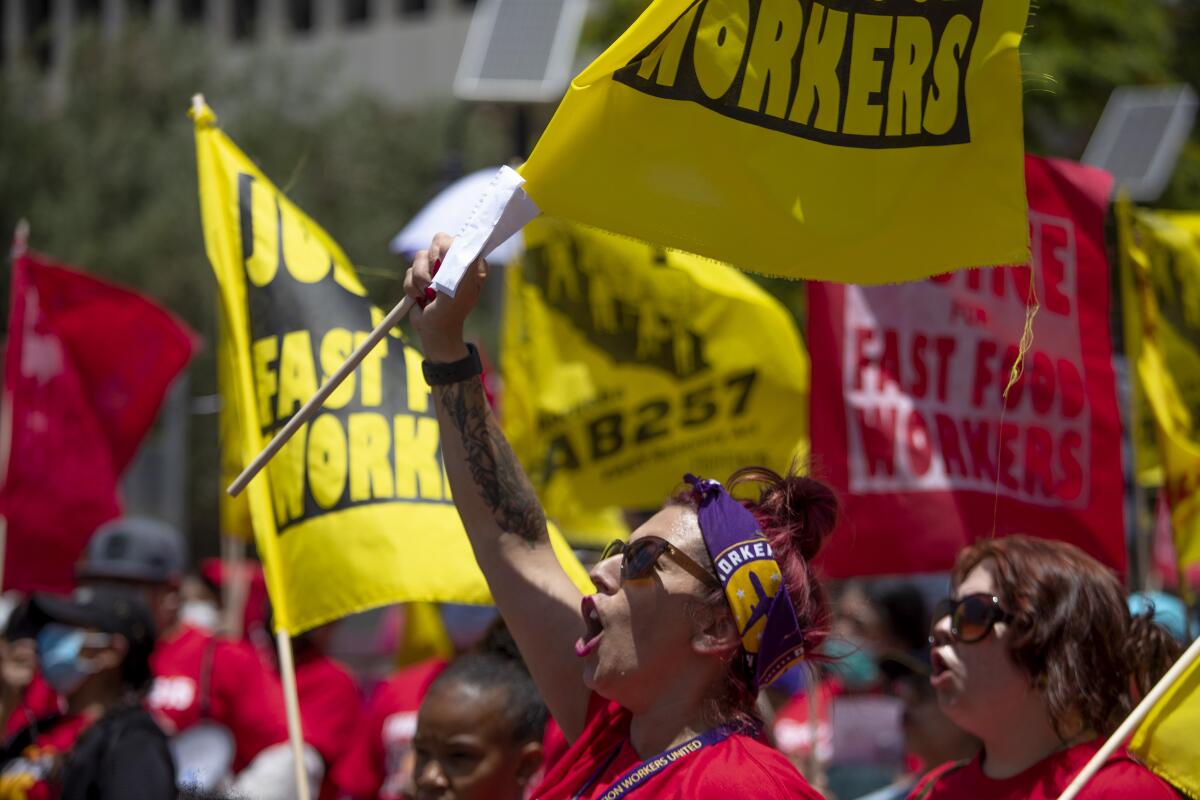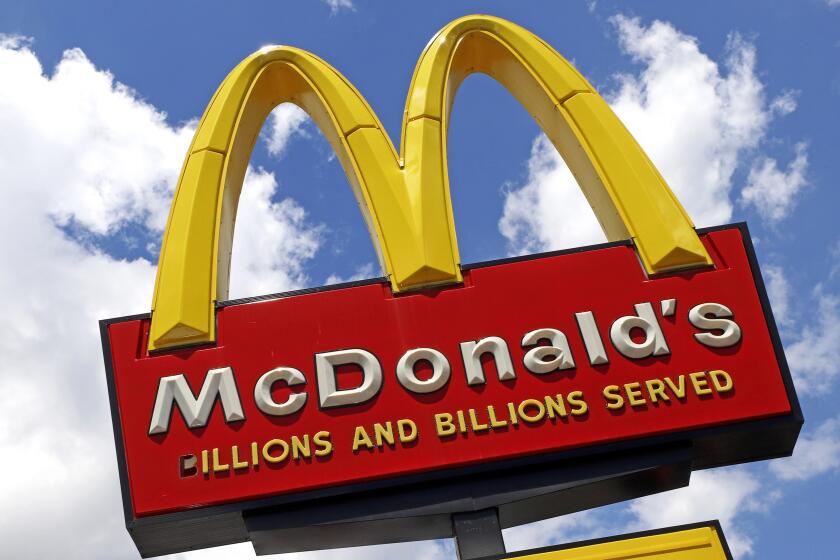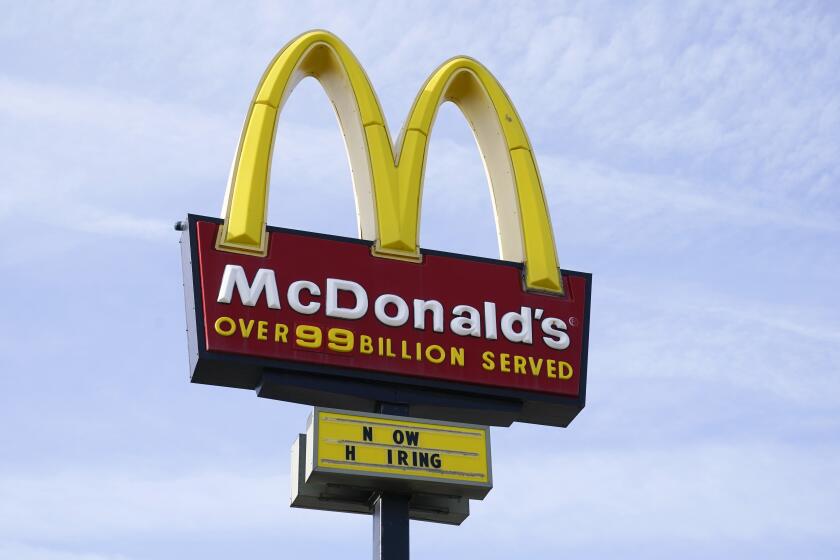California union alleges that fast-food effort to block new labor law is ‘willfully misleading voters’

- Share via
California’s largest union on Thursday lodged a complaint with state officials alleging that a fast-food industry coalition violated state election rules in its campaign to block a landmark labor law from going into effect.
The complaint by Service Employees International Union California, which was filed both with California’s secretary of state and its attorney general’s office Thursday, focuses on a referendum filed in September seeking to repeal AB 257, which Gov. Gavin Newsom signed into law on Labor Day. The union sponsored the legislation, known as the Fast Recovery Act, to boost protections for fast-food workers.
The union alleges that in a sprint to qualify the referendum for the November 2024 ballot, business trade groups, fast-food corporations and franchisees are backing a vigorous and costly voter signature-gathering process that is “willfully misleading voters.” Hired petition circulators for the referendum, according to the complaint, have approached voters and asked them to sign the petition under the false pretense that the effort seeks to raise the minimum wage for fast-food workers.
Instead, the referendum effort would allow voters to decide whether to overturn the Fast Recovery Act, which creates a first-of-its-kind council of workers, company representatives and state officials with the authority to raise the minimum wage for franchise restaurant workers as high as $22 next year.
Fast-food workers are walking off the job in support of a California bill that would establish a council to negotiate standards on wages, hours and other work conditions.
The council has a mandate to set minimum industry standards on wages, working hours and other conditions for fast-food workers statewide. It’s a model that could transform the way workers negotiate standards with their employers not just in California but across the U.S.
Throughout the legislative process, fast-food corporations and franchisees argued it unfairly singled out their industry, and would burden operations with higher labor costs and cause food prices to skyrocket.
Save Local Restaurants, the coalition pushing to overturn the law, said in a statement that it “has been vigilant in maintaining compliance with California’s election laws” and added that it finds the complaint “frivolous.”
“This is another brazen attempt by the SEIU to force a law on Californians that they do not want and that they cannot afford,” said the coalition, which is spearheaded by the International Franchise Assn. and the National Restaurant Assn.
The coalition said, in line with past critiques, that the new law would raise food prices and ultimately “cost thousands of jobs, and force the closure of local businesses.”
The coalition said it has collected “nearly a million” signatures thus far: “We are on track to collect hundreds of thousands of signatures above what is legally required due to the voters’ overwhelming opposition to this misguided law.”
It’s standard practice to collect more than the minimum number of signatures because some signatures may be deemed invalid.
The complaint alleges several instances of petition signature gatherers misrepresenting the issue. One contracted circulator in Los Angeles repeatedly said the petition “was for the minimum wage to go up,” while another in Stockton, Calif., asked for a signature on a “petition that will raise the minimum wage for fast food workers to 22 bucks an hour,” according to the complaint.
“The campaign literature, materials and other messaging clearly demonstrate an effort to persuade voters to sign a petition based on false and misleading information,” attorney Richard Rios with the law firm Olson Remcho, which represents the union, wrote in the complaint.
Big fast-food chains will spend millions to quash a California law that would help their workers.
The complaint notes that California’s election code makes it a crime for proponents of a referendum and those whom they hire to circulate a referendum petition to engage in any tactic that “intentionally misrepresents or intentionally makes any false statement concerning the contents, purport or effect of the petition.”
SEIU California in the complaint calls on state authorities to “immediately investigate” and pursue action against Save Local Restaurants, a coalition of California small-business owners, restaurateurs, franchisees and others backing the referendum as well as individual petition circulators “for willfully and knowingly publishing and exhibiting false statements” to persuade voters to sign the referendum petition.
The Times reviewed video footage captured by organizers working with SEIU’s Fight for $15 campaign showing four different interactions in which petition gatherers for the referendum portrayed it as a move to raise the minimum wage for fast-food workers.
In one video The Times reviewed, Fight for $15 organizer Cherie Wallace asks a petition circulator who approached her, “So this is to get the minimum wage to $22?”
The petition circulator repeatedly assures Wallace incorrectly that signing the petition would raise worker pay.
“Yes ma’am,” he responds.
“Why does it say it’s challenging it?”
“We gotta get more papers to get it looked at, that’s why we are trying to get more signatures.”
“So we need more signatures to get it to $22?”
Wallace goes on to point at the petition on the petition circulator’s clipboard and read it verbatim.
“What gets to me is this says it’s challenging it. Why does it say it’s ‘challenging’ it?”
The petition circulator stays silent, and Wallace prompts him again, asking if signing the petition definitely will help to raise pay.
He reassures her: “It’s for the workers like people at McDonald’s, Burger King, Taco Bell. It’s going to help them.”
To appear on the November 2024 ballot, referendum backers need to submit some 623,000 voter signatures by Dec. 4. AB 257 is set to take effect Jan. 1, but if the referendum qualifies, the law would be put on hold until voters can weigh in.
Times staff writer Melissa Gomez contributed to this report.
More to Read
Inside the business of entertainment
The Wide Shot brings you news, analysis and insights on everything from streaming wars to production — and what it all means for the future.
You may occasionally receive promotional content from the Los Angeles Times.













